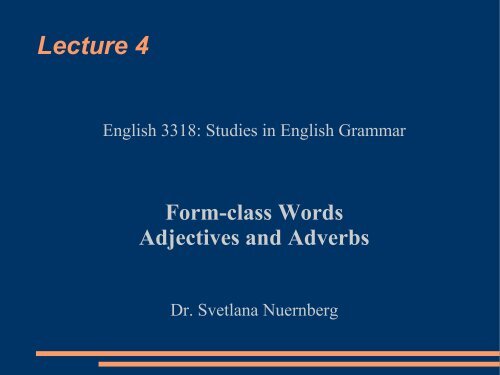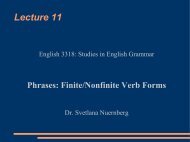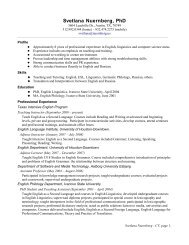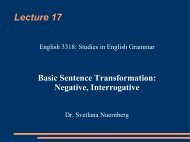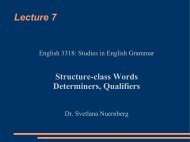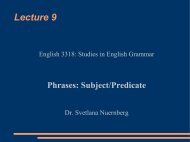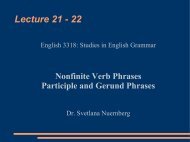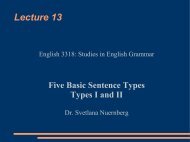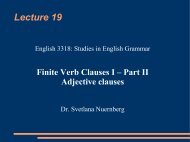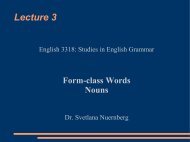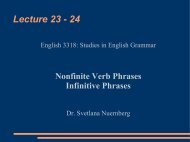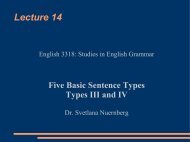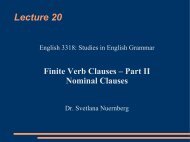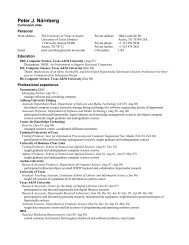Form Class Words: Adjectives/ Adverbs
Form Class Words: Adjectives/ Adverbs
Form Class Words: Adjectives/ Adverbs
Create successful ePaper yourself
Turn your PDF publications into a flip-book with our unique Google optimized e-Paper software.
Lecture 4English 3318: Studies in English Grammar<strong>Form</strong>-class <strong>Words</strong><strong>Adjectives</strong> and <strong>Adverbs</strong>Dr. Svetlana Nuernberg
Objectives●●●Differentiate between– attributive– predicative adjectivesDifferentiate between subclasses of adverbsGive supporting criteria of– form (morphology)– function (sentence position)to justify the assignment of a word to a given formclass
<strong>Adjectives</strong>●●In terms of form, adjectives are not as easilyidentifiable in isolation as nouns or verbs.We need either meaning or context or clues– Adjective Frame Sentence: The ____noun is very ___●only adjectives will fit in the both slots– Adjective Derivational Suffixes●the form of the word can also provide clues– Adjective Inflectional Affixes
Adjective Derivational Suffixes●●●The most reliable derivational suffix identifying aword as an adjective is– -ous – gorgeous, famous, courageous, contagiousThere are some other adjective forming suffixes– merry, funny - childish, reddish– beautiful, wonderful - fragmentary, complimentary– terrific, ascetic - punitive, active– fortunate, temperate - variable, amenableAs clues to adjectives, these suffixes are not asreliable as -ous,– they occasionally show up on other form classes too:handful (noun); panic (noun, verb), punish (verb)
Adjective Inflectional Suffixes●●●The inflectional suffixes that pattern withadjectives are- er, the sign for comparative form- est, the superlative form● Positive big young smart● Comparative bigger younger smarter● Superlative biggest youngest smartest
Additional Cases●●●For many adjectives the comparative and superlativedegrees are not formed with -er and -est, but withmore and most, which we can think of as alternativeforms or allomorphs– adjectives with more than 2 syllables are patterns withmore and mostExceptions are: two syllable adjectives ending in– -y or -ly (prettiest, friendlier, lovelier)– -le (nobler, noblest)– -ow (narrower, narrowest)– -er (tenderest)Some adjectives have no comparative and superlativeform: former, main, principal
<strong>Adjectives</strong> or <strong>Adverbs</strong>●●More and most are not exclusive for adjectives– -ly adverbs, those derived from adjectives, havecomparative and superlative versions: more quickly,most frequentlySmall group of words that have comparative andsuperlative forms can serve as adjectives or adverbs– inflectional test is not very reliable– early fast late high– earlier faster later higher– earliest fastest latest highest– hard long low deep– harder longer lower deeper– hardest longest lowest deepest
Exceptions●●●Near (nearer, nearest) – can serve not only asadjective and adverb, but also as a preposition, theonly preposition that takes inflection– Our seats were near the fifty-yard lineExceptions to regular comparative and superlativeforms– good bad far far– better worse farther further– best worst farthest furthest<strong>Adjectives</strong> can also be compared in a negative sensewith as, less, and least– This picnic is not as enjoyable as I thought it would be– This picnic is less enjoyable than I thought it would be– This is the least enjoyable picnic I've ever attended
Rules of Thumb<strong>Form</strong>al ProofFunctional ProofTests for <strong>Adjectives</strong>1. Has adjective-making morpheme happy, lovable, foolish2a. Takes comparative or superlative morpheme softer, softest2b. Can be made comparative or superlative more sensitive, most sensitiveby using more or most3. Can be qualified rather soft4. Can fit both slots in the frame sentence The ___noun seems very ___
Exercise 11. Create a comparative and superlative forms for theadjectives listedfriendly, helpful, wise, awful, rich, mellow, expensive, valid,pure, able2. Test each of the words below with the test foradjectives given above. Which words are adjectives?How many of the criteria are valid for each adjective?alluring, eating, skinny, pale, diet, tall, controlled, hungry– Example: selfish (adjective – 4 criteria)– Applicable: has adjective-making morpheme {-ish}, can bemade comparative/superlative with more, most, can bequalified – very selfish, fits the frame
Subclasses of <strong>Adjectives</strong>●●The adjective test frame The __noun is very____– is useful in identifying adjectives– is useful in helping distinguish subclasses ofadjectives:●●those that are limited to the prenoun slotsthose that are limited to the complement slotsMost adjectives can fill three slots in the sentencepatterns:– predicative adjectives●●as subject complement (as in the test frame)as object complement– attributive adjectives●as modifiers in the noun phrase (as in the test frame)
Attributive Only <strong>Adjectives</strong>●●A small number of of adjectives will not fill thecomplement slot - attributive only adjectives:– main, principal, former, mere, potential, atomic, late(meaning “dead”) and technical adjectives: sulfuric,hydrochloric– these do not serve as either subject or object complementsin the verb phrase, nor do they take qualifiers:● He is the former president *The president is former● My reason is main *My main reason is very main● She is a mere child *The child is mereThere are a few other adjectives that rarely appear inan attributive position in reference to animate nouns:– fond, ready, ill, well●“ill omen” but rarely *“ill person” - we will use sick instead
Predicative Only <strong>Adjectives</strong>●●Many so-called A-adjectives are predicative only:– ablaze, afraid, aghast, alone, awake●●●●The house was ablaze*The ablaze house burned down in an hourThe children were awake*The awake children were noisyIncidentally not all predicative adjectives take very,the sample qualifier in the test frame– we do not usually say:●“very afraid” or “very awake”– we would rather say:●“very much afraid” and “very much awake”– although they do combine with the other qualifiers:●quite afraid, extremely afraid, completely awake, wide awake
<strong>Adjectives</strong> Followed by Clauses●A number of adjectives in predicative position appearfrequently with complements in the form of phrases orclauses– some adjectives: fond and aware, are rarely used withoutthem:●●●●●The children were afraid that the dog would biteThe children were aware that the dog would biteThe dog was fond of biting childrenWe were conscious of the problemOur team is certain to win– these cases are called 'complements' rather than modifiersor qualifiers because they complement the idea expressedby the adjective = direct objects are complements of verbs
Ability to Combine with Qualifiers●Another subclassification of adjectives relates totheir ability to combine with qualifiers– most adjectives can be intensified, qualified: somewhatlate, rather late, quite early, very happy - gradable– certain adjectives denote meanings that are consideredabsolute: unique, square, round, perfect, single, double,fatal, empty, right, wrong, impossible– these can fill both the attributive and predicate slots, butthey can not be qualified or compared – nongradable– we can say “almost perfect” and “nearly square”, but willavoid “more perfect” and “very perfect”
<strong>Adverbs</strong>●●●<strong>Adverbs</strong> modify– verbs: Sue swims quickly– adjectives: Bill's car is mechanically sound– other adverbs: Andrew drove incredibly fast– whole sentences: Obviously, someone ate the rest ofthe pizzaare the most difficult of the four form classes toidentify and understand<strong>Adverbs</strong> overlap with adjectives (fast, slow)– The horse likes a fast track (adjective)– Don't drive so fast (adverb)– They are slow learners (adjective)– He drives too slow (slowly) (adverbs)
Derivational Suffixes●One common indicator of form is suffix – ly,which we use to derive adverbs of manner fromadjectives– tell how or in what way about the verb:●He walked slowly●●●She answered correctlyIt is not completely reliable signaler, since – lyoccurs on nouns (folly), adjectives (lovely, ugly)There are many adjectives that we can turn toadverb with morpheme {-ly}
Restrictions●●Not all adjectives can become manner adverbs,these restrictions are related to– meaning●●●describe a state – tall, oldfixed or inherit characteristic – Norwegiancharacteristic that change – weak, active, industrious– objective characteristics – tall and old– subjective characteristics – nice and splendidThe adjectives that refer to objective or stative orinherent qualities rarely become manner adverbs:– tall, old, fat, short, thick, large, flat, round, red● if they do – they have metaphorical, specialized meaning –hardly, widely, squarely, shortly, flatly
Other Derivational Suffixes●Besides -ly, two other derivational suffixesproduce adverbs: -ward and -wise– words ending in -ward signal direction: homeward,forward, backward, upward, downward– words ending in – wise, which indicate manner,include both– old usage: otherwise, lengthwise, crosswise– jargon: budgetwise, weatherwise, moneywise,profitwise
Inflectional Suffixes●●Comparative and superlative inflections: -er, -est– the comparative form of -ly adverbs, usually formed byadding more rather than -er– except for: soon, often – the only that take -er, -est– the superlative degree - most suddenly, most favorably– is rare in both speech and writing – calls attention●●The committee was most favorably impressed with theproposalThe crime was planned most ingeniouslyFlat adverbs – made from adjectives without theaddition of -ly:– early, late, hard, fast, long, high, low, deep
Adverb Subclasses●<strong>Adverbs</strong> are often categorized on the basis of thekind of information they provide– manner (how) – quickly, slowly, reluctantly, well:●The horses ran steadily– time (when) – yesterday, then, immediately●Our guest arrived yesterday– place (where) – here, somewhere, around, outside●Your boss called here– degree – strikingly, incredibly, amazingly●He is amazingly beautiful– frequency and number – often, twice, seldom●They met frequently– duration – always, still, briefly●He always bragged about it
Rules of ThumbTests for <strong>Adverbs</strong><strong>Form</strong>al Proof1. Has adverb-making morpheme suddenly, crosswise, homeward2a. Takes comparative She ran fastersuperlative morphemesShe ran fastestFunction Proof2b. Can be made comparative or more suddenly, most suddenlysuperlative with more or most3. Can be qualified rather suddenly4. Can be moved within a sentence The door opened suddenlyThe door suddenly openedSuddenly the door opened5. Can fit in the frame sentenceThe man told his story _______ .
Exercise 21. There are two – ly morphemes: one to createadjectives, another to create adverbs. Tounderstand the differences sort the followingwords into two groups: adjectives and adverbs– lovely, foolishly, absolutely, maniacally, timely,paternally, worldly, ghostly2. Decide whether each of the examples below is anadverb of time, place, manner, degree, frequencyand number or duration– soon, anxiously, somewhere, utterly, often, carelessly,●once, eternallyCan any be used more than once?


